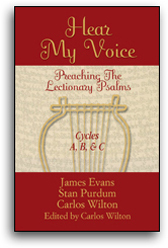SermonStudio
Proper 17/Pentecost 15/Ordinary Time 22
Preaching
Hear My Voice
Preaching The Lectionary Psalms for Cycles A, B, C
The writer of Psalm 81 employs a most interesting mixed metaphor. It is not mixed, however, because the psalmist was careless and neglected his subject matter. On the contrary, it is because of an important insight into human nature that the psalmist has us "eating with our ears."
Verse 10 rehearses what was, and is, the most basic confession of faith for followers of the Lord. God speaks and says, "I am the Lord your God, who brought you up out of the land of Egypt. Open your mouth and I will fill it."
Verse 10 rehearses what was, and is, the most basic confession of faith for followers of the Lord. God speaks and says, "I am the Lord your God, who brought you up out of the land of Egypt. Open your mouth and I will fill it."


